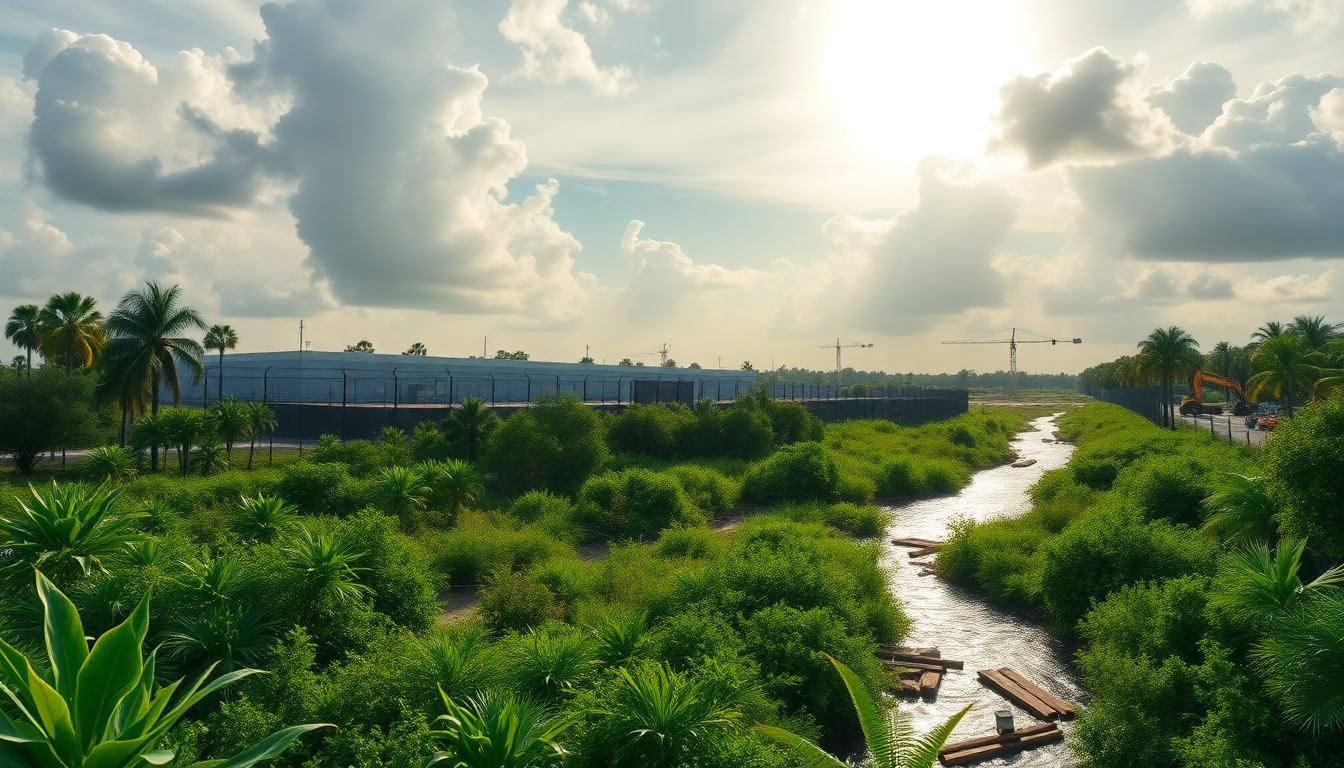Table of Contents
A recent ruling by a federal judge has put a stop to the expansion of the Florida immigration detention center, often referred to as ‘Alligator Alcatraz.’ This decision isn’t just about construction; it highlights the ongoing tug-of-war between immigration policy and environmental protection in sensitive areas like the Florida Everglades. With growing concerns about the ecological impact of such facilities, this injunction brings to the forefront crucial issues surrounding legality, environmental stewardship, and human rights. So, what does this really mean for Florida and its future?
A Judicial Standstill: The Details of the Injunction
On Thursday, U.S. District Judge Kathleen Williams issued a preliminary injunction, effectively blocking the state from expanding the Alligator Alcatraz immigration detention center, which sits within the fragile ecosystem of the Everglades. This ruling formalizes a temporary halt that had been informally ordered two weeks earlier, following extensive hearings that aimed to assess the environmental repercussions of the facility’s expansion. But what led to this crucial decision?
Environmental protection advocates, including the Miccosukee Tribe and various groups, have long claimed that the construction violates several federal and state environmental laws. They argue that expanding this facility poses a significant threat to the surrounding wetlands, which are home to many protected species and essential for the region’s ecological health. Their lawsuit emphasizes that this expansion could jeopardize years of restoration efforts that have cost billions. It’s hard not to wonder: how often do economic interests clash with environmental concerns?
In response, the state’s attorneys have argued that the facility’s operations fall under Florida’s jurisdiction, suggesting federal environmental regulations shouldn’t apply. However, Judge Williams ruled that the detention center is a collaborative effort between state and federal authorities, making it subject to federal environmental standards. This ruling isn’t just a legal technicality; it reflects growing societal concerns about the intersection of immigration enforcement and environmental responsibility.
Judge Williams also noted that the number of detainees is expected to decrease in the coming months as the state arranges transfers to other facilities. She mandated the removal of certain infrastructure, like fencing and generators, from the site. But what are the implications of these changes for the people involved?
The Environmental Implications of Alligator Alcatraz
The geographical location of the Alligator Alcatraz facility raises serious questions about the decision to build an immigration detention center in such an ecologically sensitive area. The Everglades are known for their rich biodiversity and serve as a crucial habitat for numerous endangered species. Environmental advocates argue that this site was chosen hastily, without considering alternative locations that wouldn’t pose such risks to the environment. Isn’t it time we prioritized ecological health in our policy-making?
Critics of the facility’s construction have also highlighted various issues regarding the living conditions within the detention center. Detainees have reported unsanitary conditions, including infestations and inadequate access to basic hygiene facilities. These reports raise ethical questions about how individuals within the immigration system are treated, complicating the narrative surrounding Alligator Alcatraz even further. How can we ensure humane treatment while enforcing immigration laws?
This judicial ruling signals a growing recognition of the need for a balanced approach to immigration enforcement that doesn’t compromise environmental integrity. As state officials consider their next moves, including a potential appeal against the decision, the dialogue around Alligator Alcatraz is likely to evolve, reflecting the complexities of policy-making amid environmental challenges. What does the future hold for such facilities?
Looking Ahead: Potential Outcomes and Implications
With the injunction in place, the future of the Alligator Alcatraz facility hangs in the balance. Florida officials, including Governor Ron DeSantis, have expressed their intent to appeal the ruling, claiming it oversteps judicial authority. They argue that the state is entitled to manage its own immigration detention facilities, a stance that underscores the contentious political climate surrounding immigration and enforcement policies. Where do we draw the line between state rights and federal regulations?
As the legal battles unfold, the implications of this injunction are expected to resonate throughout Florida and beyond. If the state ultimately prevails, it may set a precedent for similar facilities across the nation, raising further concerns about the environmental costs associated with immigration enforcement. However, if the ruling stands, it could signify a vital shift in how environmental considerations are woven into discussions about immigration policy. This case could serve as a catalyst for greater scrutiny of future detention center projects and prompt a reevaluation of their locations, particularly in ecologically sensitive areas. Are we finally ready to acknowledge the environmental costs of our policies?


